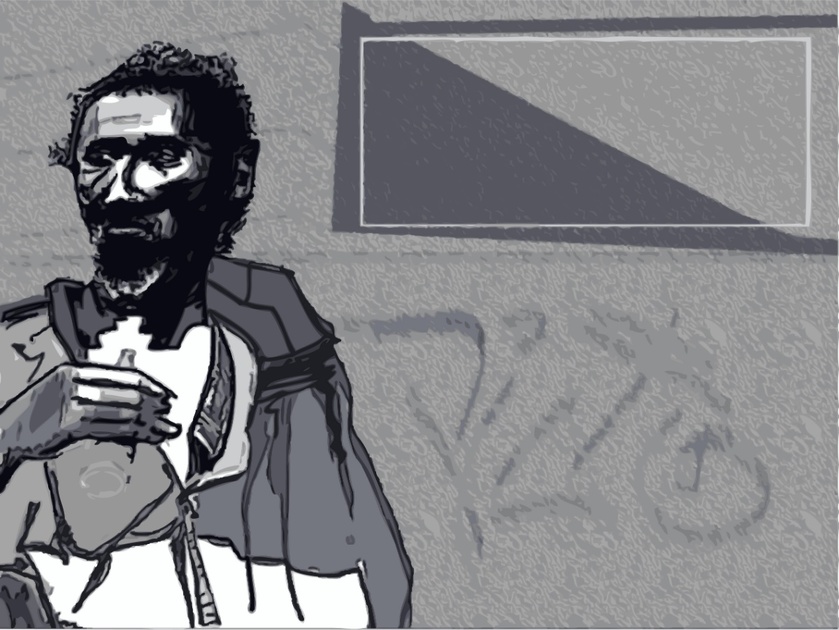
Dear Therapist:
Recently a “nebach” has started frequenting our shul. He seems to be homeless, does not properly care for himself and clearly has serious psychological issues. He also talks to himself (or someone else that only he can see). Sometimes kids hang out around him, sometimes teasing him, but mostly he keeps to himself. Trying to get what he can at kiddush and shalosh seudos. I wonder how one can tell if someone like this is safe? Should we be concerned about having him around? If yes how can we deal with removing him? Come to think of it, even if he isn’t a danger what can we do to get him help?
Response:
Simply on the basis of this gentleman’s appearance, assumed living status, and apparent mental health issues, there is no way to know whether he is safe. In fact, it seems that most of the people who are arrested for dangerous behavior are “regular,” “normal” members of the community. We have all heard about well-respected doctors, rabbis, lawyers, therapists, and others who have been arrested for inappropriate actions that leave devastation and horror in their wake. For the most part, the people who perpetrate these atrocities appeared to exhibit no obvious signs that would lead people to believe that they were capable of such actions.
The factors that you point to as troubling are homelessness and psychological issues. These often go hand-in-hand. When people with mental health issues are not successfully treated, this can lead to their inability to maintain employment and housing. Homelessness often further exacerbates the emotional problems, thus perpetuating a vicious cycle.
Many people with severe mental health issues are cared for by family members or others. Though their symptoms are likely to be less pronounced than if they were homeless (due to treatment), many of those living at home with severe emotional issues are very similar to the person whom you described. The observed differences between these people and those who are homeless may be related directly to the homelessness itself.
When people are homeless and mentally ill, and have no one to care for them, they are less likely to properly care for themselves. They may be more likely to exhibit externalized, obvious symptoms, and they are certainly more likely to scavenge for food.
The person to whom you refer may in fact not be homeless; he may simply be mentally ill with no one to help him. Or he may have trouble accepting the help that would make him appear more presentable. Regardless, people who cannot adequately provide for themselves will naturally scavenge for food and other needs. Homeless people often eat out of the trash. This person—at least once a week—has the option of obtaining a Shabbos meal at your shul’s kiddush in a more respectable manner.
Most people who have emotional issues are not dangerous. Absent any threatening behavior, it doesn’t sound as if you are identifying anything that is indicative of a problem. You said that this man generally keeps to himself, and you didn’t mention any kind of threatening behavior. In fact, it seems as if the kids seek him out rather than the other way around. It is generally inappropriate for children to simply hang out with any adult. It is incumbent on the parents to make it clear to their children that they should not be seeking this man’s attention or spending time with him. Since this particular adult may not have the wherewithal or social capability to avoid their advances, parents need to let their kids know that it is not appropriate.
Generally, children should be educated on safety matters, and on the importance of immediately discussing with an adult any inappropriate or threatening behavior. They should understand that such behavior is unacceptable regardless of the nature or status of the person who initiates it. As parents, we have the responsibility of knowing where, and with whom, our young children are at all times.
It seems like you don’t know much about this gentleman. It doesn’t seem as if you know where he lives, whether he has close family, or whether he is being treated for any kind of mental health issues. You likely don’t even know his name. If you are concerned for him, the obvious first step would be to obtain this information. Someone else in the shul or neighborhood may know him. Once you know his circumstances, if you feel that he needs help, there are resources such as social services agencies that can be contacted.
Yehuda Lieberman, LCSW
psychotherapist in private practice
Brooklyn, NY | Far Rockaway, NY
author of Self-Esteem: A Primer
www.ylcsw.com / 718-258-5317

 Previous
Previous
